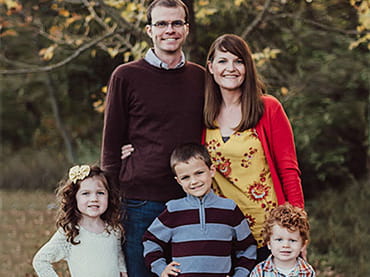The Challenge: Brain Fog
With the temperature edging toward 100 degrees, Josh spent July 13, 2015 on a motorbike running errands in northern Thailand. He and his family were based in Southeast Asia, working with the Global Hope Network International (GHNI)— a Swiss-based humanitarian nonprofit.
Josh came home tired and dehydrated, but he couldn't resist when his children begged him to join them on their trampoline.
“I never fell or hit my head, but when my feet landed on one jump, it didn't feel right. I literally felt my brain hit the front of my skull," he recalls.
It triggered an array of problems that Josh and his wife, Lisa, feared would be permanent.
“The next day I worked from home in a brain fog," says Josh, then 32 years old. “And I cancelled dinner with friends. I was nauseous."
His family doctor in Thailand told him dehydration could shrink the brain, but a CT scan showed no damage.
“She told me to take it easy and drink lots of water," says Josh. “But I knew something more was wrong."
At first, Josh saw some improvement.
But two minor bumps to the head worsened his symptoms, which included:
- Trouble balancing and judging distances.
- Getting easily tired.
- Painful headaches.
- Sensitivity to light and noise.
- Atypical mood swings.
Then one night, Josh couldn't even tell a taxi driver where to drive him home.
The Path to the UPMC Sports Medicine Concussion Program
Josh went on to see neurologists, each confirming that he had a concussion and telling him to rest. But his symptoms wouldn't go away.
Unable to work, Josh and his family returned home to Maryville, Illinois, in January 2016.
“We tried to get an appointment with a neuropsychologist in nearby St. Louis, but couldn't get one for 10 months," he says.
Josh's wife had heard about the UPMC Sports Medicine Concussion Program through an online concussion support group and called. Three weeks later, she had Josh meet with the program director, Michael “Micky" Collins, PhD.
“At that point, I was getting ready to file for permanent disability," says Josh. “I thought, what do I have to lose? If I don't get better, I'll know I saw one of the top concussion doctors in the field."
The Solution: Concussion Treatment and Recovery
Josh scored in just the 50th percentile on ImPACT® (Immediate Post-concussion Assessment and Cognitive Testing) during his first appointment.
Dr. Collins told him that rest was the exact opposite of what he needed.
“He said that if I followed his directions, I could expect to regain a normal life," says Josh. “Dr. Collins took time to explain the science behind his approach. He's done extensive research. I trusted his history and depth of knowledge."
"While everyone's concussion is different, if you've been seeking help with out results, I'd recommend UPMC's concussion program with out hesitation." — Josh
Josh's treatment included:
- Exertion therapy to strengthen his balance and sensory system.
- Behavioral therapy to confront situations he was avoiding due to fears they could trigger concussion symptoms. Doctors link balance and vestibular issues to the emotional center of the brain, which can create higher levels of anxiety.
Josh recalls Dr. Collins telling him that he couldn't hide from his symptoms. He needed to attack them.
“Those words freed me to tackle my fears. The therapy wasn't easy, but it produced results," Josh says.
Three weeks later, Josh had his second appointment with Dr. Collins. He showed impressive test gains, reaching the 76th percentile in cognitive performance.
On his third visit six weeks later, his scores exceeded the 90th percentile.
The Results: A Trip Back to Asia
Josh describes his work with GHNI as “more of a calling than a job." GHNI serves people on the fringes of society worldwide through knowledge transfer and community development.
“The thought of not being able to continue that work was daunting," he says. “But thanks to the UPMC Sports Medicine Concussion Program, I went back to work with limited hours in November 2016."
Dr. Collins' final assignment was for Josh to take an overseas trip as part of the healing process.
“That was major. Sleep hygiene is a huge part of my recovery and travelling abroad really wreaks havoc on sleep," says Josh.
In March 2017, Josh and his wife successfully traveled back to Southeast Asia.
It marked the first of many trips for GHNI to Myanmar, Kenya, and Hawaii — and an upcoming return assignment in Thailand.
Running was also part of Josh's rehab. Though he doesn't think of himself as a true runner, Josh ran a 5K race and placed third in his age group.
His final meeting with Dr. Collins was in April 2017.
“He said my tests were normal and my results phenomenal," says Josh. “I no longer live my life with restrictions, but I know when I push myself too far. While everyone's concussion is different, if you've been seeking help without results, I'd recommend UPMC's concussion program without hesitation."

















